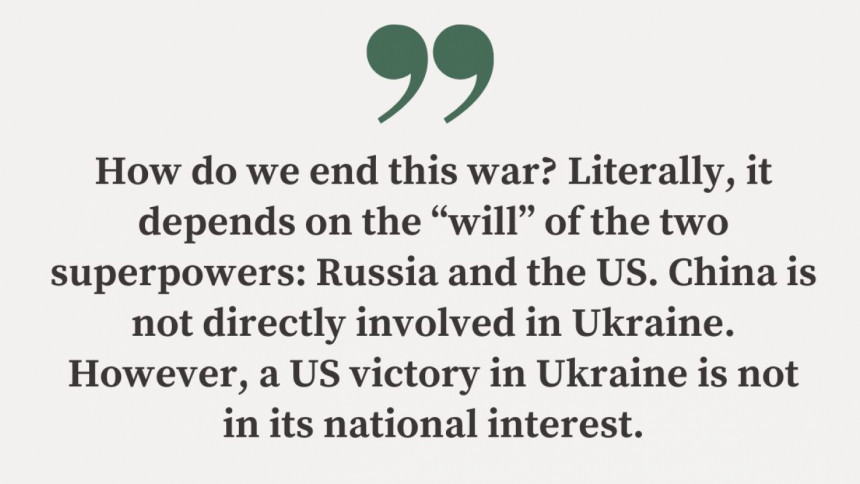September 5, 2022
DHAKA – Henry Kissinger is not a popular person in Bangladesh. As a national security adviser of the US government, he opposed the creation of Bangladesh during Nixon’s presidency. Later, he called the country a “bottomless basket.” This was not the first instance where he offended a nation or made a controversial statement. He advocated a protracted stalemate during the Iran‐Iraq War (1980–88) to sustain American influence in the region. Nearly half a million people died. In 2012, he said, “In 10 years, there will be no more Israel.” His tacit support for the Chinese government’s crackdown to end the student protest in 1989 was not received favourably by the advocates of democracy. At 99, he remains controversial for his dispassionate views.
Recently, he suggested that Ukraine should settle with Russia by relinquishing its territorial claims to Crimea and granting autonomy to the Donetsk and Luhansk people’s republics. On August 13, 2022, in an interview with RT, he stated, “We are at the edge of war with Russia and China on issues which we partly created, without any concept of how this is going to end or what it’s supposed to lead to.” Specifically, he was concerned about the current state of power disequilibrium among China, Russia, and the US.
If unchecked, the current disequilibrium could lead to World War III. This has been the observation of many, including UN Secretary-General António Guterres. On August 1, 2022, at a global meeting on nuclear weapons, he warned that the world was just “one misunderstanding, one miscalculation away from nuclear annihilation.” We must come out of this disequilibrium through peaceful negotiations.
Despite the controversy, Kissinger’s statement on disequilibrium should be reckoned with. He observed a similar disequilibrium during the 1970s and was directly involved in establishing a new equilibrium by ending the Vietnam War and opening the door to China. Over the years, that equilibrium fell apart because of many reasons: the breakup of the Soviet Union; rise of China and emerging nations; globalisation; technology and IT revolution; social media; economic growth disparity; demographic shift; and rise of nationalism.
Kissinger’s views on international relations reveal a doctrine-like pattern. It can be encapsulated in three Ps: power, purpose, and pragmatism. Power dynamics is his core. He plays the power card by accepting reality. During the Vietnam peace negotiations, he retained America’s supremacy by sharing power. To him, a war without a “purpose” or an end in sight is a meaningless undertaking. That is how he reasoned to put an end to the Vietnam war. He also advocates the realpolitik school of thoughts, which puts practical interests of nations over ideological positions. Reaching out to China was an example of his “pragmatism.”

Evidently, a protracted war is not a desirable outcome for Russia. However, it will not be able to stop the war if America drags it. Lingering the stalemate to weaken Russia is an untested hypothesis. A no-compromise power play with mounting deaths and destruction is not justifiable. Inflation, unemployment, food shortages and starvation are not defensible. The world is paying heavily for a senseless war. This is neither pragmatic, nor morally acceptable.
How do we end this war? Literally, it depends on the “will” of the two superpowers: Russia and the US. China is not directly involved in Ukraine. However, a US victory in Ukraine is not in its national interest. In the US, China is perceived as the “rising superpower” – as described by Graham Allison’s “Thucydides Trap” term. Most nations in the world are helpless observers and have very little influence on the current war and its consequences.
World leaders should seriously consider ending this war and establishing a new equilibrium. A negotiated outcome in Ukraine could advance a new world order encompassing change in geopolitics, economics, culture, technology, and security. We can achieve this through multilateral negotiations. The end result should a) acknowledge the power of the hegemons; b) revisit the UN structure for reform; c) restart the nuclear disarmament talks; d) establish a multipolar world; and e) offer a sustainable peace.
Here’s hoping we can come to an agreement soon. Failing to do so, the world could descend to a different kind of equilibrium after a nuclear holocaust. Definitely, that is not what we want.
Dr Abu NM Waheeduzzaman is a professor of marketing and international business at Texas A&M University-Corpus Christi, US.


